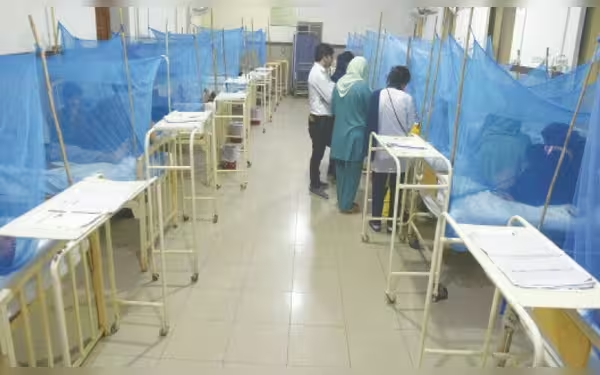Saturday, November 16, 2024 05:52 PM
Dengue Cases Surge in Punjab: 149 New Infections Reported
- 149 new dengue cases reported in Punjab.
- Rawalpindi is the most affected area with 134 cases.
- Public urged to take preventive measures against dengue.
 Image Credits: dawn.com
Image Credits: dawn.comPunjab reports 149 new dengue cases, with Rawalpindi most affected. Urgent preventive measures and public awareness are essential.
Dengue fever, a viral infection transmitted by mosquitoes, has become a significant health concern in Pakistan, particularly during the monsoon season. The recent surge in cases has raised alarms among health officials and the public alike. As of now, a total of 149 new dengue cases have been reported across Punjab, highlighting the urgent need for preventive measures and public awareness.
Rawalpindi has emerged as the most affected area, with a staggering 134 cases recorded. This alarming figure underscores the severity of the situation in the city. Following Rawalpindi, Bahawalpur has reported three cases, while Lahore has seen two cases. Other districts, including Sheikhupura, Jhelum, Faisalabad, Attock, Kasur, Mianwali, Khanewal, Nankana Sahib, and Narowal, each reported one case. This widespread distribution of cases indicates that the dengue virus is not confined to a single area, but is instead affecting multiple regions across Punjab.
The increase in dengue cases can be attributed to several factors, including the recent rains that create ideal breeding conditions for mosquitoes. Stagnant water, which often collects in various places after rainfall, serves as a breeding ground for these disease-carrying insects. Therefore, it is crucial for residents to take proactive steps to eliminate standing water around their homes and communities.
Health authorities are urging the public to remain vigilant and take necessary precautions. Simple measures such as using mosquito repellent, wearing long-sleeved clothing, and installing screens on windows can significantly reduce the risk of mosquito bites. Additionally, community awareness programs are essential to educate people about the symptoms of dengue fever, which include high fever, severe headache, pain behind the eyes, joint and muscle pain, and rash.
The rise in dengue cases in Punjab serves as a stark reminder of the importance of public health awareness and preventive measures. As the community grapples with this health challenge, it is vital for individuals to stay informed and take action to protect themselves and their families. By working together and remaining vigilant, we can combat the spread of dengue fever and safeguard our communities from this preventable disease.













